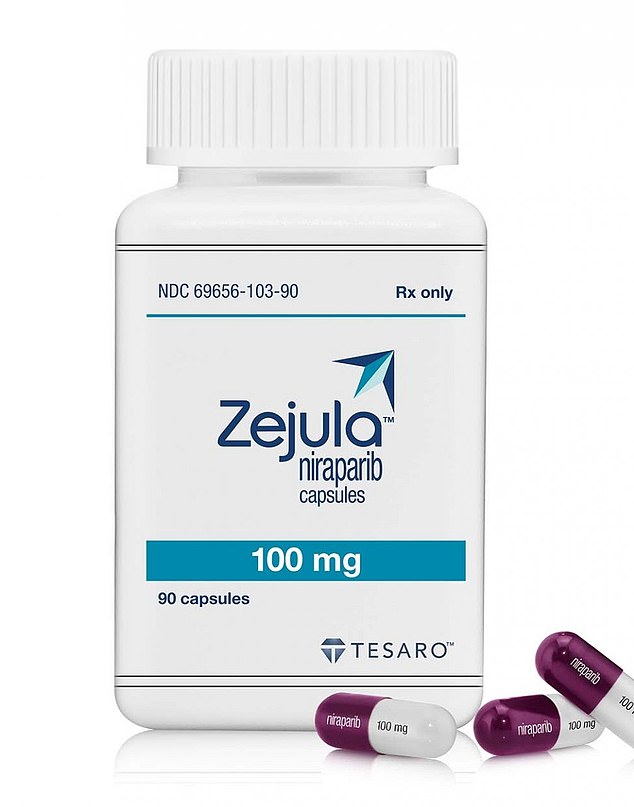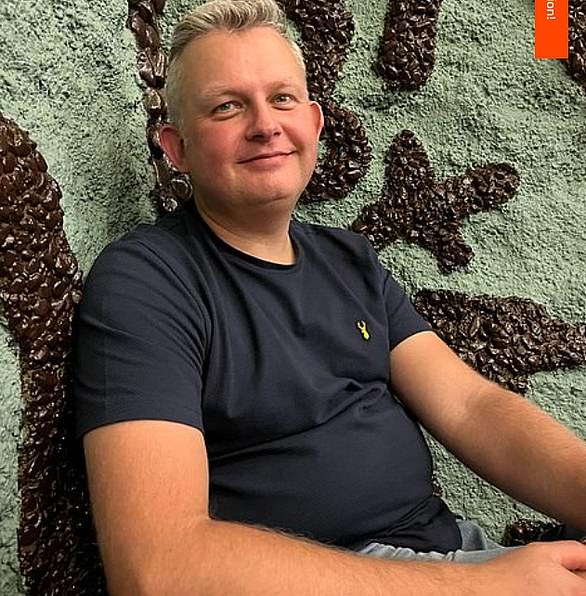New drugs combo brings hope of cure to men with terminal prostate cancer: Seven pills a day pulled Andy, 51, back from brink of death
A man who was given just years to live after being diagnosed with aggressive and incurable prostate cancer is now nearly tumor-free, just months after starting a revolutionary drug treatment.
In April, Andy Willis became one of the first people to ever receive the experimental therapy after he was told his cancer was too advanced for conventional treatment.
The 51-year-old Lancastrian now takes seven pills a day – with no side effects. Crucially, scans show that the cancer is now almost undetectable.
“Every day I thank my lucky stars that I have the opportunity to use this medicine,” says Andy, a retired church member. ‘It went downhill. I was sick and weak. Within weeks of starting treatment, the pain subsided and I had more energy. I feel like I have my life back.’
The new drug, called AZD5305, is a type of advanced tablet known as a polyadenosine diphosphate-ribose polymerase (PARP) inhibitor – designed to kill cancer cells by preventing them from repairing themselves.
Another PARP inhibitor, called olaparib, was approved earlier this year for certain NHS patients with prostate cancer and breast cancer. The breakthrough drug is also used to treat a number of other forms of the disease, including ovarian and fallopian tube cancer.

The new drug, called AZD5305, is a type of advanced tablet known as a polyadenosine diphosphate-ribose polymerase (PARP) inhibitor – designed to kill cancer cells by preventing them from repairing themselves.
However, around half of all patients taking olaparib will experience anemia – where low red blood cell counts lead to fatigue and reduce the effectiveness of cancer treatment. Almost anyone who takes olaparib and develops the condition must stop taking the drug.
But AZD5305 is designed to significantly reduce the risk of anemia, uncovering a new option for this group.
‘PARP inhibitors, such as olaparib, have proven very successful in cancer patients, especially those with advanced disease,’ says Dr Andrew Hudson, clinical oncologist at Christie NHS Foundation Trust in Manchester.
‘But it carries a high risk of side effects. Olaparib also affects proteins in the bone marrow, where blood cells are produced, and there is not much we can do about that.’
However, AZD5305 does not appear to do this, as Dr Hudson explains: ‘We hope it can help younger patients with aggressive prostate cancer have a better quality of life.’
Prostate cancer is the most common form of the disease in men, with 52,000 new diagnoses each year. The majority occur in men over 65 years of age and tend to move slowly. Many patients will never need treatment because the disease does not threaten their health.
However, about a tenth of patients have an aggressive form of the disease that, even if caught early, spreads rapidly and quickly becomes fatal. This prostate cancer is usually hereditary – caused by errors in the patient’s genes – and affects younger men. These patients make up a large proportion of the approximately 12,000 Britons who die from prostate cancer each year.
About half of all men with advanced prostate cancer survive less than five years.
In April, patients with a certain type of hereditary aggressive prostate cancer caused by the BRCA gene mutation were given the opportunity to receive olaparib. Experts claim that there are other people with hereditary cancers who could ultimately benefit from it as well. “We know from studies that patients with DNA damage respond best to PARP inhibitors,” says Dr. Hudson. ‘BRCA is an example of this.’
AZD5305 is designed to be taken every day alongside another pill called enzalutamide, which blocks the effect of testosterone on prostate cancer cells.
The early-stage trial, which is taking place at Christie NHS Foundation Trust and other hospitals around the world, will see a small number of prostate cancer patients given the drug to analyze their risk of anemia.
If the trial shows that the drug significantly reduces the number of cases, the next step will be a larger trial to decide whether it can be offered to patients as an alternative to olaparib.
Dr. Hudson says that while it is too early to conclude whether the drug will be available on the NHS, he has been surprised by Andy Willis’ overwhelmingly positive response to the treatment.
“It’s certainly better than we expected if he was just taking enzalutamide,” he adds. ‘And, crucially, he has not experienced any serious side effects.
‘We are entering a new era for the treatment of these aggressive prostate cancers, thanks to drugs such as PARP inhibitors.
‘These patients have now been living for a number of years, continue to work and lead relatively normal lives.
‘But that is dependent on the condition that they do not experience side effects, including anemia. A drug that can help avoid that risk would make a big difference.’

